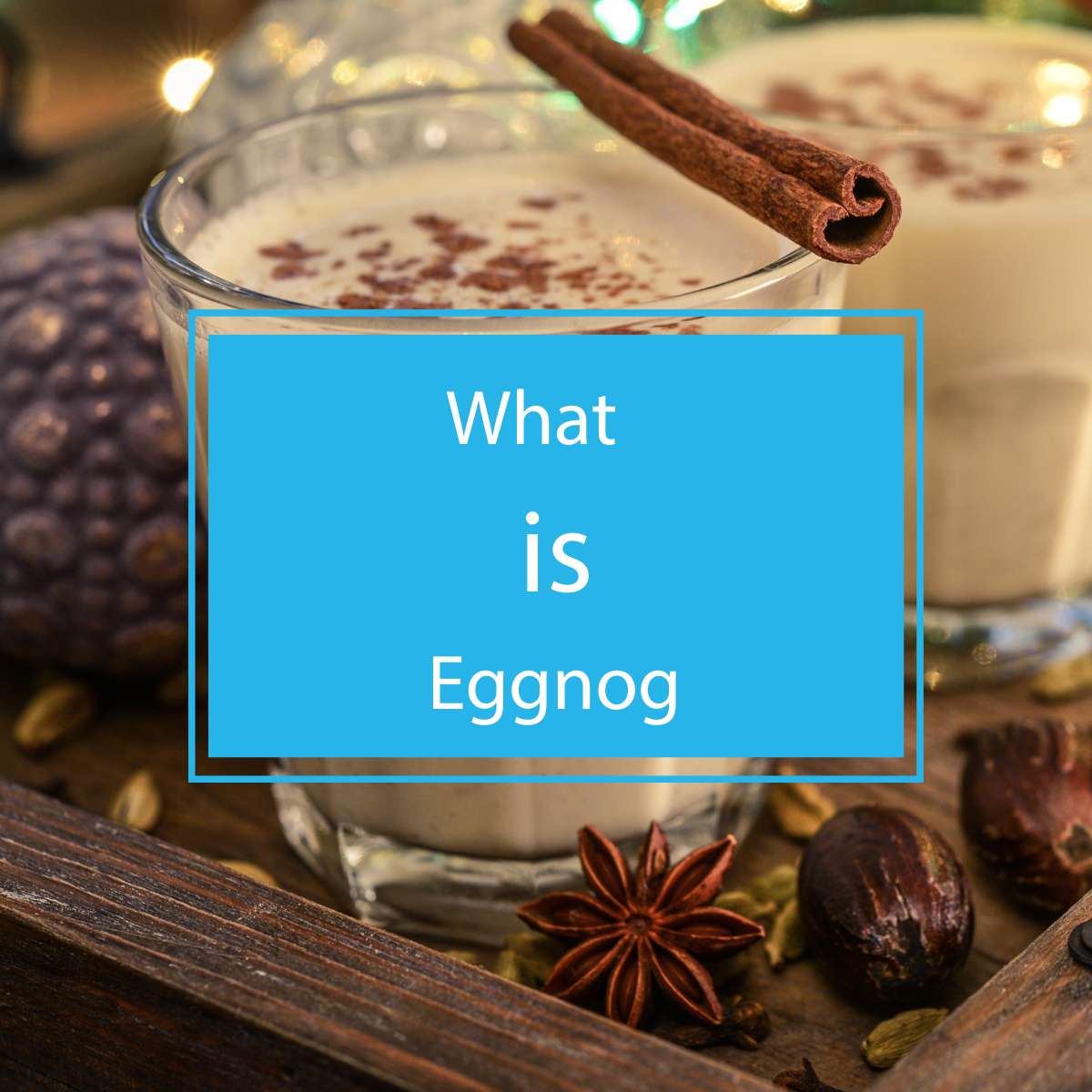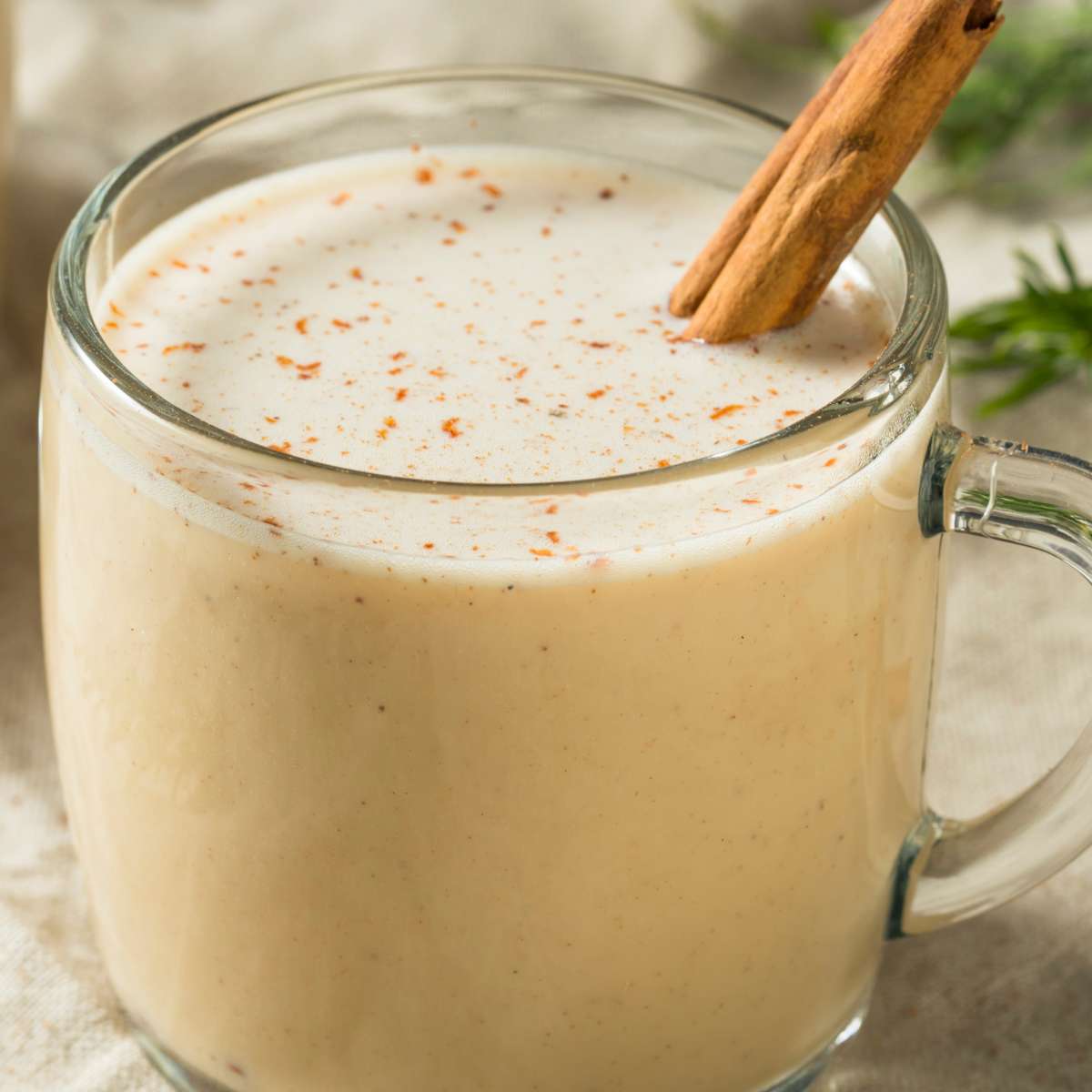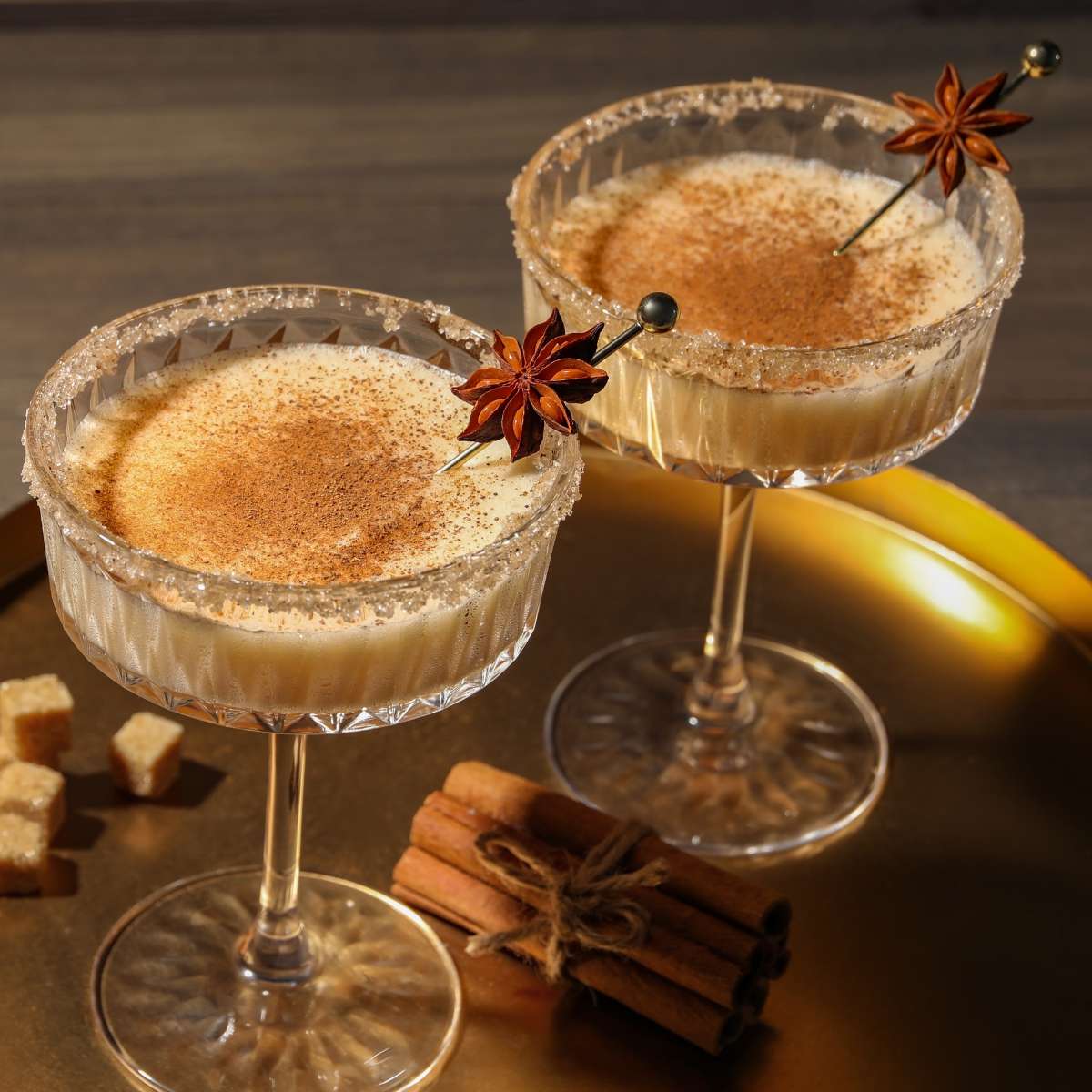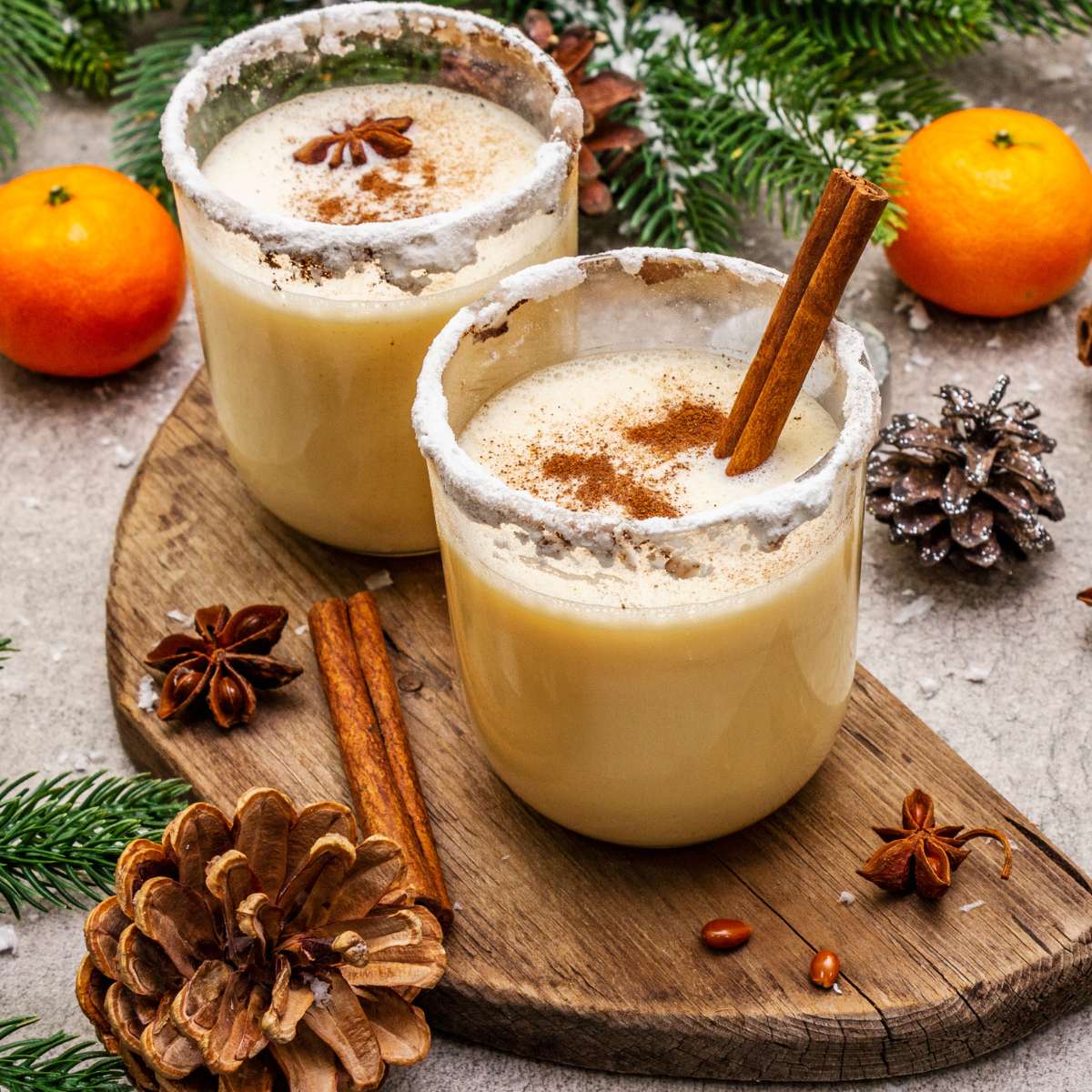As the holiday season marches ever closer, one age-old question plagues the minds of many: what is eggnog, and why is it so deeply associated with festive cheer?
This **eggnog mystery** seems to captivate us year after year, as we gather around punch bowls filled with the creamy concoction and solemnly raise our glasses to toast yet another Yuletide season. Indeed, eggnog has become synonymous with **holiday beverages**, but how much do you really know about this elusive drink?
Today’s your lucky day! We’re going to peel back the layers and delve into the fascinating world of eggnog, bringing you the history, recipe, and traditions surrounding this classic **festive drink**. Now, let’s get cracking!
Key Takeaways
- Eggnog is a creamy, delicious holiday beverage often enjoyed during the Winter season.
- Eggnog can be traced back to 16th-century England, where it was a popular drink among the aristocracy.
- The essential ingredients of eggnog are eggs, milk, cream, sugar, and spices like nutmeg and cinnamon.
- Alcohol, such as bourbon, is often added to eggnog for a spirited kick, but non-alcoholic varieties also exist.
- Eggnog has become a staple of holiday festivities, and has even spawned its own day of celebration: National Eggnog Day on December 24th.
The Historical Froth: Eggnog in the Ages
Take a stroll down memory lane to explore the rich eggnog history and its significance in holiday traditions. This frothy indulgence dates back to the 16th-century, brimming with captivating tales that speak to its timeless appeal.
The 16th-Century Origins of Eggnog
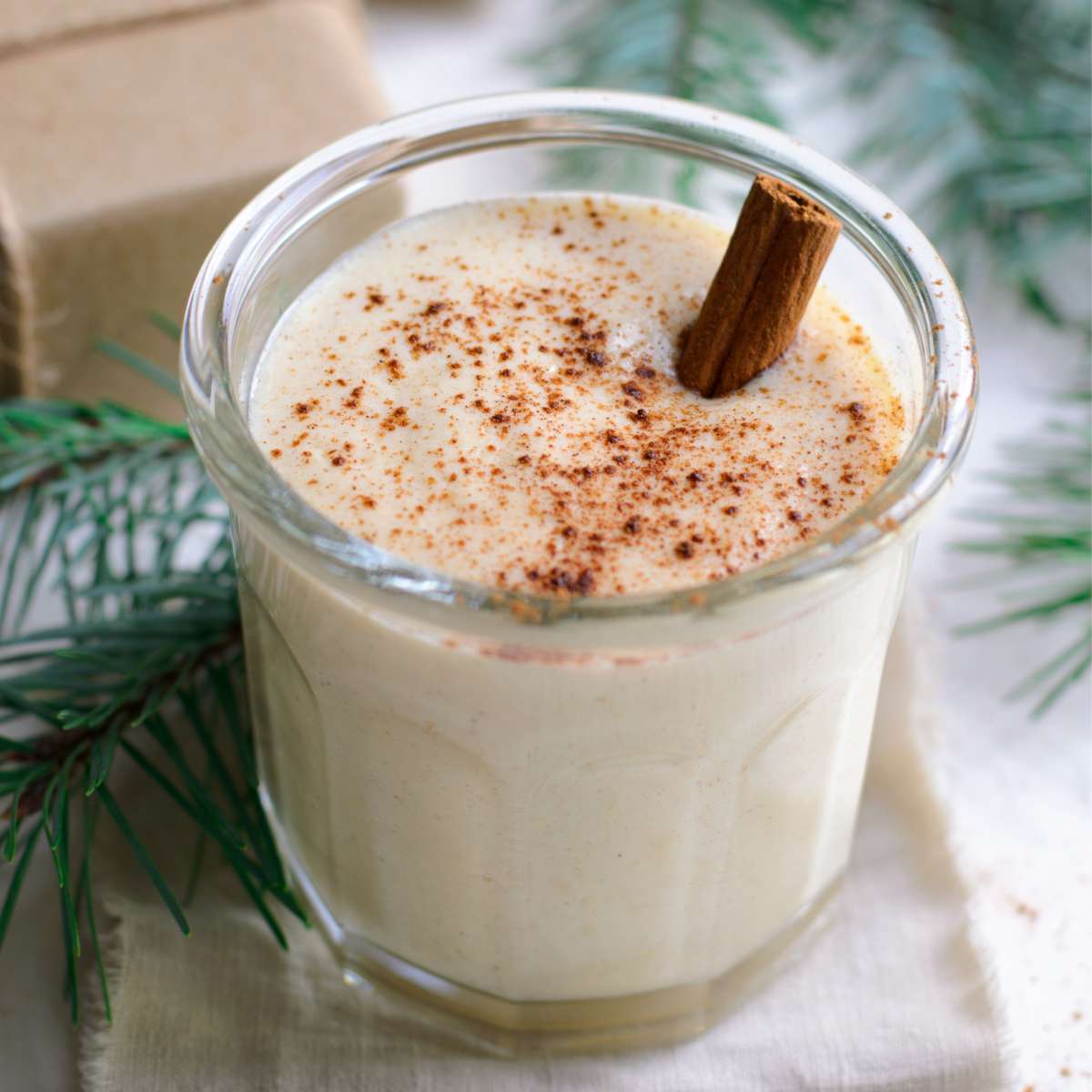
Eggnog’s origin story is believed to have unfolded in 16th-century England, where aristocrats would enjoy “posset,” a creamy precursor to the modern eggnog. This warm, milky drink combined eggs, sugar, and spices with wine or ale, bringing a touch of opulence to their celebrations.
Later, when the beverage made its way across the Atlantic to the American colonies, colonists replaced wine with more accessible liquors, like rum and whiskey, customizing the recipe and shaping its taste to their preferences. Thus, the classic eggnog we know and love today was born.
The Infamous Eggnog Riot of 1826
One unforgettable event etched in eggnog history is the “Eggnog Riot” that took place at West Point Military Academy in 1826. Fueled by a potent batch of homemade eggnog spiked with whiskey, the cadets engaged in a chaotic, alcohol-induced tumult lasting a day, causing considerable damage and leading to numerous court-martials.
This wild episode illustrates eggnog’s societal impact as both a source of merriment and, in some cases, unruliness.
From its noble beginnings to its occasional rowdiness, eggnog has solidified its status as a beloved holiday beverage. Its longstanding connection to festive customs and spirited events only adds to its rich narrative, reinforcing its place in the annals of history.
Spirited Debate: The Eggnog’s Controversial Ingredients
The festive allure of the perfect eggnog recipe triggers a cascade of impassioned conversations, with enthusiasts fervently debating the merits of its core elements. The heart of the matter lies within the eggnog ingredients that concoct the quintessential holiday delight, with alcohol’s involvement often taking center stage.
What’s In the Quintessential Eggnog?
Like a symphony of seasonal flavors, a classic eggnog recipe calls for a harmonious blend of eggs, sugar, milk, and cream, elevated even further by a dash of warming spices. The traditional holiday beverage typically boasts a hint of nutmeg or cinnamon, enhancing its rich and creamy texture. The table below outlines the fundamental components of a basic eggnog:
| Ingredient | Role |
|---|---|
| Eggs | Provide thickness and smoothness to the drink |
| Sugar | Sweetens and balances the flavors |
| Milk | Forms the liquid base, lending a velvety mouthfeel |
| Cream | Enhances richness and creaminess of the drink |
| Nutmeg/Cinnamon | Introduces a touch of seasonal warmth and aroma |
However, it is the optional, yet hotly contested addition of alcohol that truly stirs the pot, igniting spirited discussions among family members and friends alike.
The Role of Alcohol in Eggnog
Alcoholic eggnog is synonymous with holiday revelry, as the inebriating effects of spirits like bourbon or rum contribute to the convivial atmosphere. Many passionate defenders of the boozy variant argue that a tipple or two deepens the flavor and warmth of the irresistible concoction, transforming it from a tame family treat into the life of the party.
On the other end of the spectrum, the purists opt for a classic, non-alcoholic eggnog, emphasizing the delectable interplay of its basic ingredients without the distraction of alcohol.
Hidden beneath the surface of this seemingly innocuous debate, a rift is created that challenges long-held beliefs about the essence of holiday celebrations and the true identity of the beloved eggnog.
Whether you’re drawn to a boozy eggnog recipe or prefer a more traditional interpretation, the beauty of the notorious holiday drink lies in the versatility of its ingredients and its enduring power to unite and bring warmth during the festive season.
A Seasonal Phenomenon: Eggnog and the Holidays
Eggnog has become an inseparable part of holiday festivities, often dubbed the “candy corn of Christmas.” Its presence is a signal for the season’s arrival, enjoyed by many during the cold winter nights. This seasonal drink embodies the spirit of togetherness and indulgent celebration that defines the holidays.
Its unique combination of ingredients and texture makes it a holiday staple on tables nationwide.
Eggnog’s status as a holiday phenomenon is evident in the ways it is enjoyed across the country. From being served at festive gatherings to gracing the shelves of local stores, the foam-topped concoction looms large in the imagination of Christmas revelers.
Its role in the American Christmas tradition is further solidified by the ever-popular event of National Eggnog Day falling on the eve of the grand celebration.
“I would say that Christmas and eggnog are like Batman and Robin – they just go hand in hand.” – Bobby Flay
Let’s take a closer look at some of the common holiday scenarios where Christmas eggnog enjoys its starring role:
- Family gatherings: Eggnog serves as the perfect ice-breaker for bonding with relatives and distant cousins amidst the holiday cheer.
- Office parties: The versatile beverage adds a touch of warmth and camaraderie to office gatherings, fostering an ambiance where coworkers can unwind together.
- Christmas markets: Warm, rich, and comforting, eggnog is a mainstay at cold-weather outdoor events, providing an indulgent pick-me-up for revelers.
From its humble origins to its modern-day legacy, the tale of eggnog’s rise to holiday fame is a heartwarming Christmas narrative. As you sip this creamy delight by the fireplace this season, rest assured that you are partaking in a celebratory ritual steeped in history and shared by millions across the nation.
From West Point to Your Kitchen: Eggnog Throughout America
It’s fascinating to ponder the evolution of eggnog tradition as an American holiday drink and its unwavering cultural relevance. Emerging from the liquid fray of the infamous Eggnog Riot at West Point, this timeless beverage has traversed a remarkable journey to establish itself as a staple at holiday gatherings across the nation.
The Transformation of Eggnog Through Time
From its humble origins as a medieval British posset, eggnog has undergone a radical transformation to arrive at its present-day avatar. The recipe’s gradual refinement, alongside the assimilation of choice spirits into the concoction, has yielded a delectable drink with an abiding cultural significance.
This metamorphosis of eggnog over the centuries is a testament to its persistent appeal as a cherished holiday beverage.
Eggnog’s Cultural Relevance in the United States
“I will honor Christmas in my heart, and with Eggnog in my belly.” – Charles Dickens (probably)
With each passing year, eggnog continues to reinvent itself and strengthen its cultural foothold in American festivities. From intimate family get-togethers to bustling office parties, this frothy favorite remains an evergreen symbol of yuletide cheer and merriment.
Eggnog’s cultural resonance transcends traditional holiday treats, making it an enduring piece of Americana, defined by its unique recipe and inexorable association with seasonal celebrations.
Celebrating with a Cup: National Eggnog Day
As Christmas Eve approaches, many eagerly anticipate National Eggnog Day, a festive celebration that has woven itself into the fabric of American holiday traditions. Marking the unofficial kickoff to Christmas, this sweet, spicy, and cheerful observance brings people together over a shared love for this creamy concoction, uniting past and present in a delightful toast to the season.
Traditions and Celebrations Around a Glass of Eggnog
On National Eggnog Day, family and friends come together to revel in the Christmas spirit by raising a glass filled with this beloved seasonal beverage. Participating in cherished Christmas Eve traditions, folks from all walks of life indulge in eggnog’s cozy warmth, often using this time to share stories, laughter, and memories of holidays past.
It is truly a moment of respite amidst the bustling preparations of last-minute gift-wrapping and baking marathons, allowing everyone to pause, savor the moment, and appreciate the company of those who matter most.
Why National Eggnog Day Is on Christmas Eve
The decision to designate National Eggnog Day on Christmas Eve is both symbolic and practical. This holiday classic has long been associated with winter celebrations, especially Christmas Eve traditions, and this convergence of dates serves to heighten the anticipation for the big day itself.
Additionally, it’s practical to celebrate with a glass of eggnog the night before the holiday, providing a joyful reprieve from the frenetic flurry of activities that often characterizes the festive season.
Overall, National Eggnog Day on Christmas Eve allows families and friends across the nation to unite in the spirit of togetherness and indulge in eggnog celebrations that have stood the test of time.
What is Eggnog: Cracking the Creamy Composition
Decoding the alluring charm of eggnog begins with a deep understanding of its creamy holiday beverage composition. At the heart of this festive drink lies a harmonious medley of ingredients, each contributing to the scrumptious flavor and velvety texture that has captured the hearts of many.
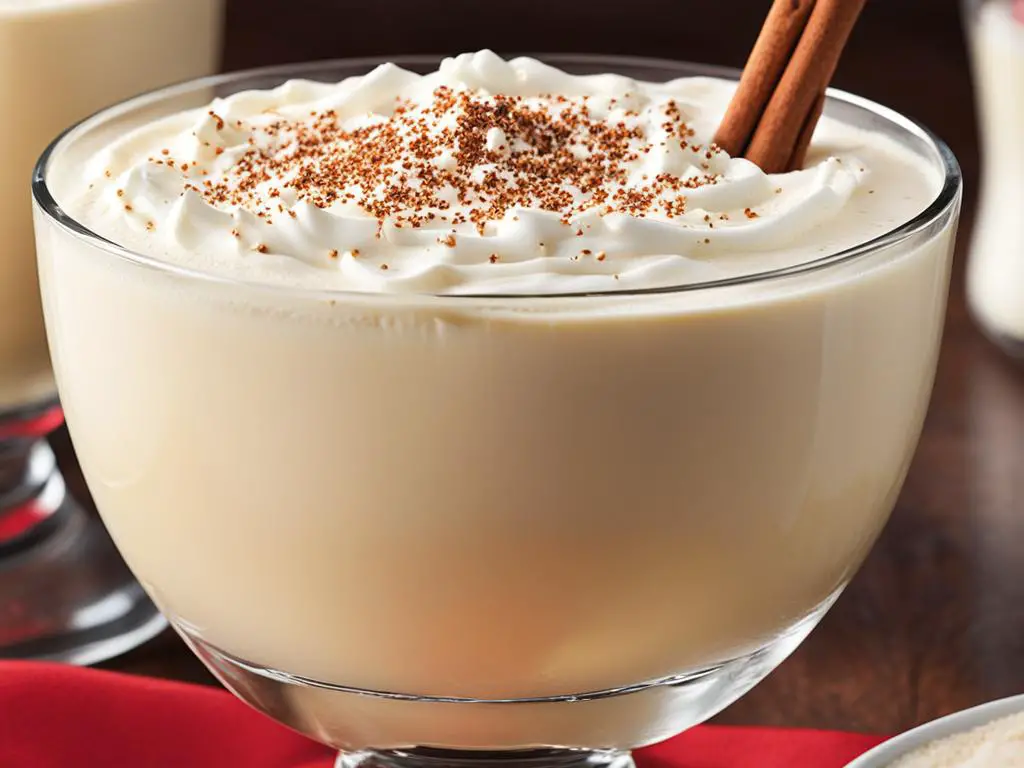
- Freshly-laid eggs
- Velvety cream
- Rich milk
- Fine sugar
These four fundamental eggnog components blend seamlessly to create the base of this cherished concoction. Seasonal recipe enthusiasts often agree that the real enchantment of eggnog unfolds when the symphony of fragrant spices joins the mix.
“No eggnog is complete without a dash of cozy warmth that can only come from the addition of enticing spices.”
Intrigued by what makes the perfect blend? Let’s dive into the most common spices that add their distinct warmth and aromatic charm to eggnog:
- Nutmeg
- Cinnamon
- Allspice
- Cloves
- Cardamom
It’s the alchemy of these elements carved into the seasonal recipes passed down through generations that entices our senses and make eggnog such an enduring holiday staple.
| Eggnog Component | Role in the Recipe |
|---|---|
| Freshly-laid eggs | Bulk, structure, and richness |
| Velvety cream & Rich milk | Smooth texture and delectable creaminess |
| Fine sugar | Sweetness and balance |
| Spices (Nutmeg, Cinnamon, etc.) | Flavor, warmth, and aroma |
With this newfound appreciation for eggnog’s creamy composition, you’re now equipped to dive into the world of seasonal recipes, explore variations, and even create your own cup of festive cheer. So go ahead and treat yourself to this delightful concoction as you celebrate the warmth and conviviality of the holiday season!
Artisanal vs. Store-bought Eggnog: A Taste Test
When it comes to eggnog, opinions on the best version can vary widely. Some prefer the convenience of store-bought holiday drinks, while others champion the flavor of artisanal eggnog made from scratch. What makes homemade eggnog stand out? And is DIY eggnog worth the effort? Let’s compare these two options and find out.
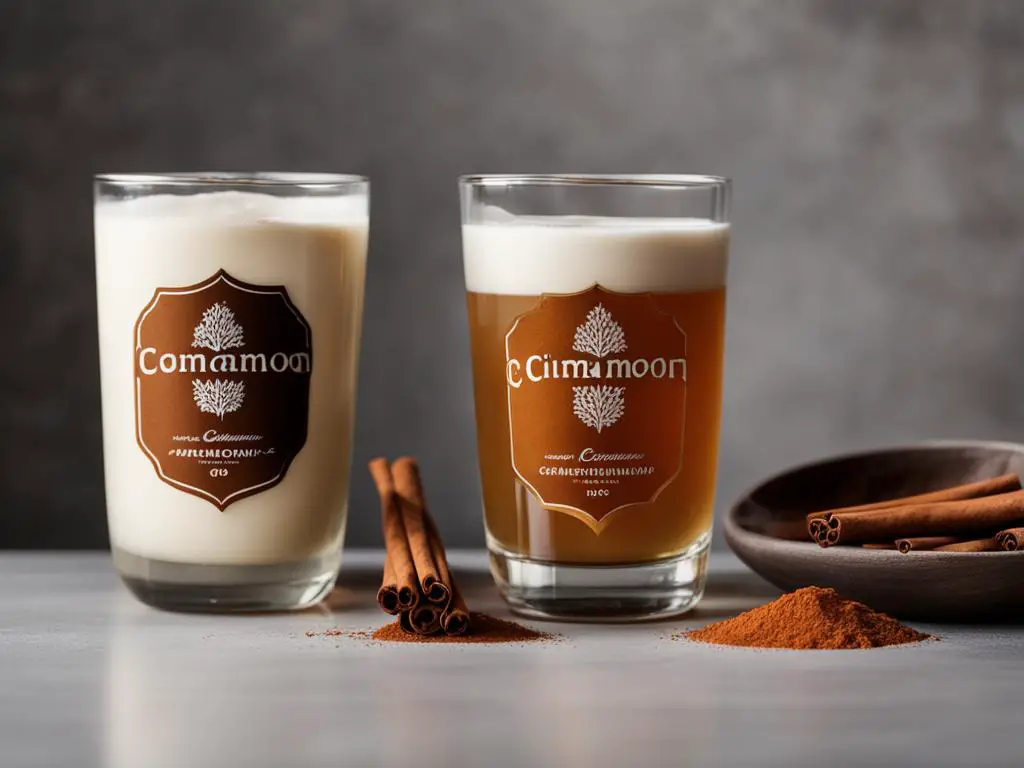
The Differences Between Homemade and Commercial Eggnog
Artisanal eggnog, crafted with love and care, often boasts a richer, creamier texture and delightful nuances of natural spices compared to store-bought alternatives. Commercial eggnog, on the other hand, is mass-produced and may contain stabilizers or preservatives that can impart a slightly artificial taste.
Flavor: Homemade eggnog gains an upper hand in the taste department, as you have the freedom to experiment with spices and ingredients, achieving the perfect balance of sweetness, creaminess, and spice catered to your own taste buds.
Quality: With DIY eggnog, you have full control over the quality of the ingredients. This means you can choose organic eggs, fresh spices, and premium spirits when it comes to making your concoction.
Customization: When it comes to store-bought eggnog, your options could be limited. With homemade eggnog, you have the power to customize your drink to accommodate allergies, dietary restrictions, or simply to cater to your personal preferences.
Is DIY Eggnog Worth the Effort?
Ultimately, the decision comes down to your priorities and what you’re seeking in your holiday beverage. If you’re a purist with a discerning palate or simply enjoy the process of creating something from scratch, donning your apron and crafting a batch of artisanal eggnog might be right up your alley.
On the contrary, if convenience is your priority, and you’re not concerned with slight variations in flavor or texture, store-bought holiday drinks will serve your purpose just fine. Furthermore, some highly-rated commercial eggnogs manage to capture that homemade essence, albeit with potential trade-offs in ingredient quality or customization.
In the end, both options have their merits. As you raise your glass for a toast this holiday season, the choice between artisanal and store-bought eggnog comes down to your time, energy, and personal preferences. Cheers to that!
Holiday Cheers with Eggnog: Recipes to Try at Home
Invoking the spirit of the season, homemade eggnog recipes cater to diverse tastes and preferences, from a boozy kick to a non-alcoholic treat. Elevate your holiday celebrations with these creative and delicious recipes, sure to delight you and your guests.
The Hard-Nog Life: A Boozy Eggnog Recipe
For those seeking to add some excitement to their festivities, the Hard-Nog Life recipe offers a delectable twist on the traditional eggnog. Infused with espresso or strong brewed coffee and a generous pour of bourbon, this spiked concoction delivers both bold flavors and festive cheer to your holiday soirée.
Non-Alcoholic Variations for All Ages
If you’re organizing a family-friendly gathering, or simply prefer an alcohol-free option, non-alcoholic eggnog recipes can still bring the magic of the season to your table. By using simple ingredients like eggs, vanilla, powdered sugar, and cream, you can create a classic eggnog or experiment with your own delightful variants that keep the merriment intact.
Embrace the warmth and joy of holiday togetherness with these homemade eggnog recipes, perfect for sipping by the fireside.
FAQ
What is eggnog?
Eggnog is a creamy holiday beverage traditionally made from eggs, milk, cream, sugar, and spices like nutmeg or cinnamon. It can also be spiked with alcohol, such as bourbon, for a spirited touch.
When and where did eggnog originate?
Eggnog has a rich history dating back to the 16th century, likely originating in Europe, and has since become a deeply rooted holiday tradition in many countries, including the United States.
What was the Eggnog Riot of 1826?
The Eggnog Riot was a historic event that occurred at West Point Military Academy, where the consumption of alcoholic eggnog led to a chaotic and disorderly scene involving numerous cadets. The event remains an unusual and intriguing part of American history.
Are there any notable variations of eggnog?
In addition to the traditional eggnog recipe, numerous variations exist, catering to different tastes and preferences. Some popular variations include adding coffee or chocolate, adjusting the ratio of ingredients for a lighter or richer consistency, and offering non-alcoholic versions for a more family-friendly drink.
What is the significance of National Eggnog Day?
National Eggnog Day, celebrated on Christmas Eve, symbolizes the excitement and festivity surrounding the holiday season. The day encourages people to indulge in this classic beverage while enjoying the company of family and friends.
What’s the difference between homemade and store-bought eggnog?
Homemade eggnog typically boasts a richer, more authentic flavor as it is made with fresh, natural ingredients, while store-bought eggnog may contain stabilizers and preservatives. The homemade route allows for customization and often ensures a superior taste experience.
Are there any popular eggnog recipes to try?
Some popular eggnog recipes include the “Hard-Nog Life,” which combines traditional eggnog with coffee and bourbon, and non-alcoholic variations for a more family-friendly approach. The beauty of eggnog lies in its versatility, so feel free to experiement and find the perfect mixture that fits your taste.
